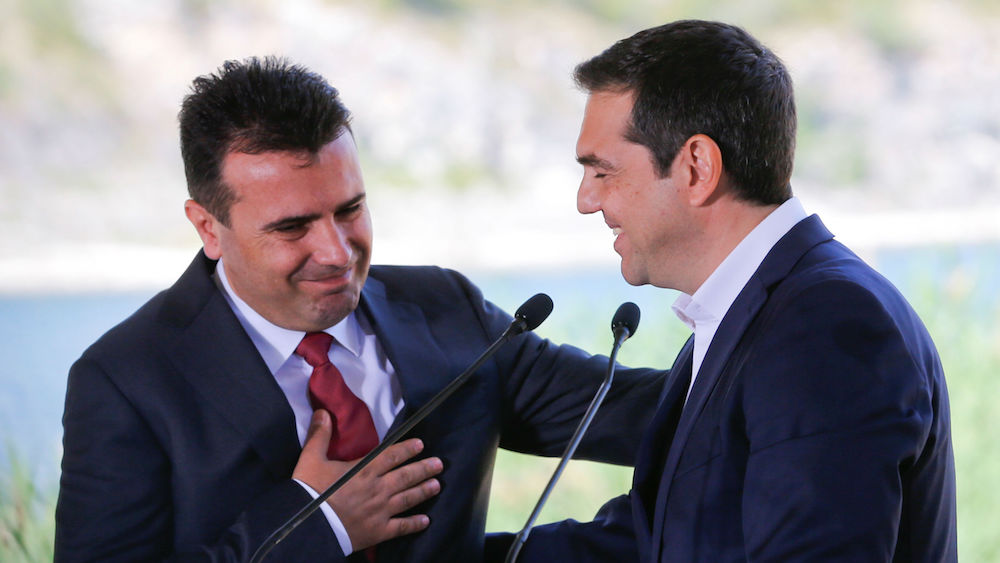Recent agreement in a long-running naming dispute between Greece and Macedonia has been hailed as a breakthrough. But nomenclature aside, not all is well in the Balkans—and Brussels must act soon.
The 28-year long row between Macedonia and Greece appears to be over. The international community can finally put the five-letter acronym FYROM (the Former Yugoslav Republic of Macedonia) aside and embrace its new moniker.
In a deal reached last Sunday, Macedonia will rename itself the Republic of North Macedonia. The Greek and Macedonian foreign ministers met at Lake Prespa which straddles their common border to sign the agreement, joined by UN mediator Matthew Nimetz and EU foreign policy chief Federica Mogherini.
The two countries’ young prime ministers, Alexis Tsipras and Zoran Zaev, were also on hand to celebrate the historic rapprochement. In front of the cameras, they spoke of peace, stability, and, of course, music. There were even shows of friendship—Tsipras and Zaev exchanged three kisses, as is tradition in the Balkans region, and Zaev removed his tie to hand it over as a present for the always-tieless Tsipras.
And the agreement was indeed historic. For decades now, political careers in Greece have been built on the mantra that all things Macedonian are Greek. Now, Athens will recognize its neighbor as North Macedonia. Macedonia, meanwhile, will be able to call its language and its citizens Macedonian, but it will cease to make claims on Hellenic history or the ancient Greek King of Macedonia Alexander the Great. In return, Athens has agreed to stop vetoing Macedonia’s EU and NATO membership. In the Balkans—Europe’s traditional powder keg—that’s a lot of compromising.
At home in their respective countries, however, the deal sparked outrage among nationalists; they protested outside both parliaments, chanting: “Down with the traitors. You’re selling our country. Macedonia is ours.” And both governments know the issue is not well and truly resolved. First, they’ll have to convince the people of their countries that the deal is mutually beneficial. Then they have to submit the agreement to their parliaments for ratification.
The FYROM needs to change its name by the end of 2018 and expunge any territorial claims on the northern Greek province of Macedonia from its constitution. After that, it will need to notify all countries as well as international organizations and institutions that its name has been changed to the Republic of North Macedonia.
Within a month from the signing, a joint committee of experts on historic, archaeological, and educational matters must also decide whether school textbooks, maps, historical atlases, and teaching guides in both countries need revising. Another committee will meet to agree on trademarks and commercial names.
Seeking EU Membership
Macedonia will seek admission to NATO and the EU as soon as the agreement comes into effect, and Tsipras will notify the President of the European Council that he supports the opening of accession negotiations. The Greek prime minister hopes his support will boost his negotiating power during upcoming talks on Greece exiting the EU’s bailout program.
After all this, the ball is firmly in the EU’s court. Enlargement has virtual been on hold for more than a decade now, with Croatia being the last country to join in 2013. Even though the latest Commission Staff Working Document on Macedonia’s accession process, published in April, says that Zaev’s government is advancing the EU reform agenda, the absence of a concrete accession date has emboldened nationalists and euroskeptics in the country.
Ethnic passions still run high. Just last year, Zaev, who was then the leader of the opposition, was beaten up by protestors for electing an ethnic Albanian as parliament speaker. In 2001, ethnic violence broke out between the Albanian minority and security forces, spilling into an armed conflict and leading to the death of a thousand people. The violence only ended after the United Nations became involved.
For the EU, moving forward with accession might be the only way to stop Russia’s and Turkey’s expanding influence in the Balkans. But that would then be more of a political decision rather than a genuine consideration of whether the countries in question meet the EU accession criteria.
Perpetual talks with little progress have led to disengagement in the Balkans. It wouldn’t be a surprise to see some parts of former Yugoslavia falling into another world power’s lap. Both Moscow and Ankara—not to mention Beijing—have gained significant footholds in the region while, in the meantime, Brussels has been dragging its feet.







